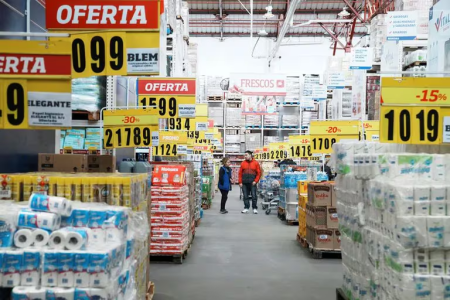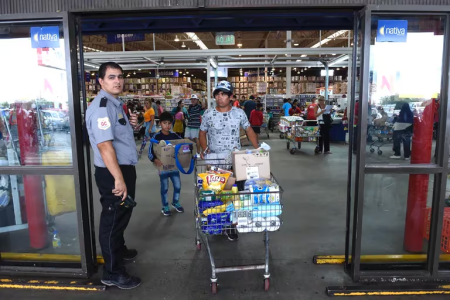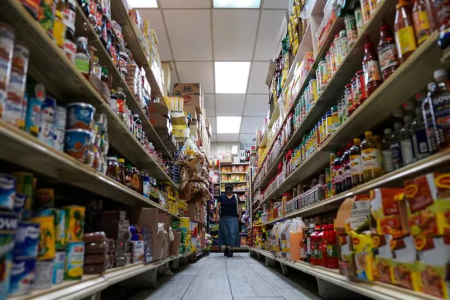All the Answers
Well-known member
Distributors and wholesalers join supermarkets' warning: municipal tax increases will bring more inflation - Infobae

Source:

Distribuidores y autoservicios mayoristas se suman a alerta de los supermercados: el aumento de tasas municipales traerá más inflación
En un comunicado, la cámara que los agrupa señaló que el aumento de alícuotas tributarias de los municipios se produce “en medio de la caída del consumo” y afecta márgenes de ganancias que -alegan- ya no se pueden comprimir
September 02, 2024
In a statement, the chamber that groups them said that the increase in municipal tax rates occurs "in the midst of falling consumption" and affects profit margins that - they claim - can no longer be compressed.

File photo: Argentine consumers look at prices at a wholesale supermarket in Buenos Aires, Argentina, May 10, 2024. REUTERS/Irina Dambrauskas
“There will be a price increase due to the increase in municipal taxes.” This is the brief and forceful title of a statement from the Argentine Chamber of Distributors and Wholesale Self-Service Stores (Cadam), warning that the increases in tax rates that are taking place in localities in Buenos Aires and throughout the country are taking place “in the midst of a fall in consumption” and that “they will generate more inflation.”
The warning follows the warning issued on Friday by the Association of United Supermarkets (ASU) , which brings together the country's main supermarket chains, reporting in particular sharp increases in rates and even doubling of costs that occur particularly in the Buenos Aires district, but also in other provinces.
Cadam recalled that according to the latest report from the National Institute of Statistics and Census (Indec), wholesale sales of basic necessities (food, beverages, cleaning products and perfumes) fell by 9.77% in June, in the year-on-year comparison.
Consumption does not pick up
Distributors and super-wholesalers emphasized: “and while consumption does not pick up, municipal taxes have skyrocketed in different municipalities of the country.”“These increases will be passed on to prices,” the statement reiterates. “The profit margin of a wholesaler is very small, between 3% and 5%, and they can no longer continue to sacrifice profitability.”
“There are unjustifiable fees, for example, they force us to plant a tree by ordinance and then they charge us a forestry tax,” describes a passage from Cadam’s statement.
Distributors and wholesalers also denounced the “tax on decals” for displaying payment methods in shop windows, and also advertising and advertising fees for what they consider to be advertising elements inside the premises, which are sometimes display cases or refrigerators containing certain brands of drinks.
The profit margin of a wholesaler is very small, between 3% and 5%, and they can no longer continue to sacrifice profitability (Cadam)
"These are just some of the municipal tax collection methods that overwhelm SMEs," they said, adding to the health and safety fees, among others," the statement said.
Distributors and super-wholesalers, in turn, "expressed their satisfaction" with the national government's decision to eliminate the copyright fee for the reproduction of music and films in the private sector.
“In the premises, music or the radio used to be played to improve the working environment and the customer experience, but that also meant paying for it,” Cadam pointed out, and even recalled that when the measure was announced, the president, Javier Milei, celebrated it by saying “One less job!”
Forced “training”
Additionally, the Chamber again asked the National Executive to eliminate the mandatory contribution of businesses to INACAP (the “Argentine Institute for Technological and Professional Training for Commerce”) in the regulations of the labor reform, because it increases labor costs without apparent compensation."It is illogical to maintain this contribution, which does not represent any benefit to the contributor or the worker, if he or she decides not to train," says the Cadam statement, which also quantifies this contribution.
This is how he presents it: “if we take into account that the “mandatory” contribution by the employer is $3,961.21 (taking only the August quota as a basis) for each commercial employee, which reaches 1.2 million workers (being the largest collective bargaining agreement in the country), INACAP would be collecting thousands of millions more per month, for the purpose of training.”
Thus, he concludes, "between taxes, contributions, and solidarity funds, the survival of companies is put at risk and investments are discouraged."

(Marcos Gomez)
On Friday, the Association of United Supermarkets (ASU) had expressed its “concern and alarm” over the increase in provincial taxes throughout the country and, in particular, in the province of Buenos Aires.
“The Association of United Supermarkets views with concern and alarm the increase in provincial and municipal taxes that has been taking place in recent months. We have a clear example of this in Lanús, Province of Buenos Aires, where the Safety and Hygiene Tax has unjustifiably been taxed at a rate of 6% of the turnover (higher than the Gross Income rate),” the supermarket owners denounced, adding that this is not “an isolated incident.”
“Measures such as the one we exemplify directly affect prices and dilute the fiscal efforts of the National Government in terms of lowering taxes and tariffs, thereby resulting in harm to all citizens and the daily economy of all Argentines,” added ASU. And the president of the supermarket association, Juan Vasco Martínez , said that the concern and alarm far exceed the issue of the Health and Safety tax in the case of Lanús.
“These are the rates and other things that go along with it,” he explained. The municipality of Pilar, also in the province of Buenos Aires, has a Safety and Hygiene Rate of 4.5 percent. Luján, for its part, has one of 4.2%, but also an “environmental” rate of 1.5 percent.

A person shops at a supermarket in Washington, DC, U.S. August 19, 2022. REUTERS/Sarah Silbiger
The director also pointed out a “curious issue” regarding the “environmental tax”, which is also charged by other municipalities in Buenos Aires and the rest of the country. In the case of Buenos Aires, he pointed out, according to provincial legislation, supermarkets, as generators of “bulky waste” have certain obligations that they assume, but Luján charges them a tax again for the same concept, “for something that you resolve on your own.”
Hurlingham, for its part, applies a rate of 4.5% and La Matanza increased the ABL (Lighting, Sweeping and Cleaning) by 113%.
It is a series of effects, Vasco Martínez stressed, who recalled that the province governed by Axel Kicillof already imposed this year an advance payment of Gross Income to be offset with other taxes, but with a compensation mechanism so slow that in fact it makes the advance payment end up being an additional fiscal burden and higher cost for supermarkets. The problem is not limited to the province of Buenos Aires. La Rioja, Vasco Martínez pointed out, has already imposed an extraordinary rate of the Gross Income tax, which also becomes, at least in part, “lost funds.”
In fact, the most recent tax "vademecum" prepared by the Argentine Institute of Fiscal Analysis (Iaraf) and published by Infobae, counted a total of 155 different taxes throughout the country in the middle of this year, including no less than 84 different municipal "rates."
Not all taxes are levied on all taxpayers. In fact, according to the Iaraf study, more than 90% of the total revenue collected by the three levels of government (national, provincial and municipal) is concentrated in just ten taxes. But that does not mean that the tax burden is particularly high, as well as administratively costly, to the point that it is estimated that SMEs pay an average of 33 taxes and must face special withholding and collection regimes for different activities.

